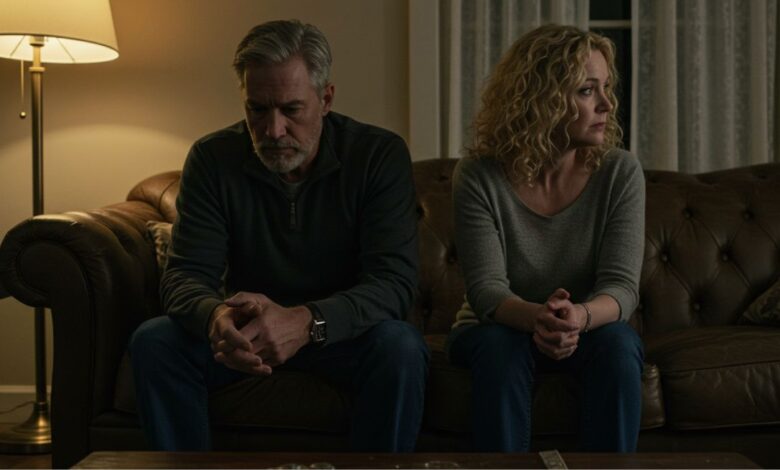
When Sarah married Michael, she believed their love could weather anything. They’d had the fairytale beginning—romantic dates, long conversations into the night, shared dreams of building a life together. But somewhere between the wedding vows and now, something shifted.
He stopped trying. She kept trying harder.
Sarah would lie awake next to a man who hadn’t touched her in weeks—not even a brush of fingers. No “how was your day?” No “you looked beautiful today.” Only silence. Cold. Constant. Deafening.
But the worst part wasn’t the lack of affection. It was feeling emotionally invisible in her own home—like a roommate in a marriage that used to be a love story.
If you’ve ever sat on the edge of your bed wondering, “Is this all there is?” you’re not alone. One-sided marriages can make you feel like you’re losing your mind and your sense of self. But the truth is: even in the loneliest partnerships, you still have power. Power to choose yourself. Power to heal.
This is your guide to surviving a one-sided marriage and reclaiming your own happiness—even if your partner never meets you halfway.

1. She Stopped Sugarcoating Her Pain
For months, Sarah told herself it was just a phase. “He’s busy.” “We’re both stressed.” “This happens to everyone.” But deep down, she knew: she was hurting. She didn’t feel loved, prioritized, or even seen.
Tip 1: Call it what it is. Stop justifying neglect. Emotional abandonment is real—and acknowledging it is the first courageous step toward change.
2. She Let Go of the Fantasy
Sarah kept comparing her reality to the version of her marriage she had dreamed about. But holding onto “what it was supposed to be” kept her stuck in denial.
Tip 2: Mourn the fantasy. Grieve the love you thought you had or hoped you’d receive. Only then can you start building something real—with or without them.
3. She Took Herself on a “Date”
One Saturday morning, Sarah dressed up and went to her favorite bookstore alone. Then she had lunch at a cozy café, journaling her thoughts. It was the first time in years she felt like her own person again.
Tip 3: Take yourself out. Rebuild the relationship with you. Happiness doesn’t have to wait for someone else to show up.

4. She Started Saying “No”
Michael had grown used to Sarah always accommodating him—his moods, his schedule, his silence. But something shifted when she began to assert gentle boundaries. “No, I’m not okay.” “No, I won’t ignore this anymore.”
Tip 4: Boundaries aren’t threats. They are guidelines for self-respect. You deserve to feel emotionally safe—even in marriage.
5. She Quit Apologizing for Her Needs
Every time Sarah tried to express herself, Michael would shut down or walk away. Eventually, she stopped asking for more. Until one day, she didn’t.
Tip 5: Stop apologizing for needing love, attention, or emotional presence. Those are basic human needs—not weaknesses.
6. She Reached Out to Her Support Circle
After years of isolating herself to “protect the image” of her marriage, Sarah finally opened up to a trusted friend. That conversation changed everything.
Tip 6: Break the silence. Talk to someone who truly listens. Emotional neglect thrives in isolation—but shrinks when met with support.
7. She Went to Therapy—for Herself
Michael refused counseling. Said nothing was wrong. But Sarah went anyway. It became a sacred space where she could unpack years of quiet pain.
Tip 7: Don’t wait for your partner to want healing. Start yours. Therapy is not about fixing them—it’s about freeing you.

8. She Stopped Chasing His Attention
There was a time Sarah would bend over backward hoping for affection—a compliment, a smile, anything. But constantly trying to prove her worth only left her more empty.
Tip 8: Love shouldn’t be earned through exhaustion. Stop performing for someone who isn’t clapping. You deserve effortless presence—not effortful survival.
9. She Turned Down the Volume on Comparison
Sarah used to scroll through Instagram, seeing “perfect” couples traveling together, celebrating anniversaries, looking deeply in love. And she’d cry. Not out of jealousy—but deep grief.
Tip 9: Social media is a highlight reel. Your worth isn’t defined by how your relationship looks to others. Focus on how it feels to you.
10. She Allowed Herself to Feel Angry
For years, Sarah numbed herself. But underneath the sadness was anger—anger for the time lost, for the emotional neglect, for shrinking herself to fit into a hollow marriage.
Tip 10: Anger is not bad. It’s a signal. Let it move you—not destroy you. Use it to reclaim your voice and values.
11. She Stopped Asking Why He Changed
Sarah tortured herself trying to figure it out. “Why doesn’t he care?” “What did I do wrong?” But not all questions have satisfying answers. Some are just invitations to let go.
Tip 11: Stop obsessing over why someone stopped loving you the way you needed. Start asking, “What now? What do I need?”
12. She Dreamed Again
It felt almost rebellious at first—to imagine a life where she was emotionally fulfilled. A home filled with laughter. A future that didn’t include walking on eggshells. But dream she did.
Tip 12: Give yourself permission to hope. Even if you stay in the marriage, you don’t have to stay in despair. Hope is healing.
13. She Reconnected With Her Past Self
While cleaning one afternoon, Sarah found an old journal entry. She had written it at 23—before the marriage—about her dreams, her favorite books, her travels. And suddenly, she remembered: She was still in there.
Tip 13: You are not just someone’s spouse. Reconnect with the version of yourself that existed before the emotional drought. She still matters.
14. She Redefined What Success Meant
For years, Sarah believed that “staying married no matter what” was the ultimate success. But now, success looked different. It looked like peace. Authenticity. Joy. Whether she stayed or left.
Tip 14: Redefine what happiness and success mean to you. A successful marriage isn’t just one that lasts—it’s one where love flows both ways.
15. She Took Her Power Back—One Step at a Time
Sarah didn’t leave overnight. She didn’t have all the answers. But she made daily choices—small, brave, personal ones—that brought her back to life.
Tip 15: You don’t need a dramatic exit. You need consistent self-commitment. Little steps become a path. That path leads home—to you.
Final Words: You’re Not Broken—You’re Becoming
Being in a one-sided marriage doesn’t mean you’re unlovable. It means you’ve been carrying more than your share of the emotional load. And it’s time to set it down.
Whether you choose to stay or leave, this isn’t just about your relationship—it’s about your restoration. Your story doesn’t end in abandonment. It begins in your awakening.
So ask the questions. Feel the feelings. Make the changes.
Because the greatest love story of your life… might be the one you finally write with yourself.
th yourself.





